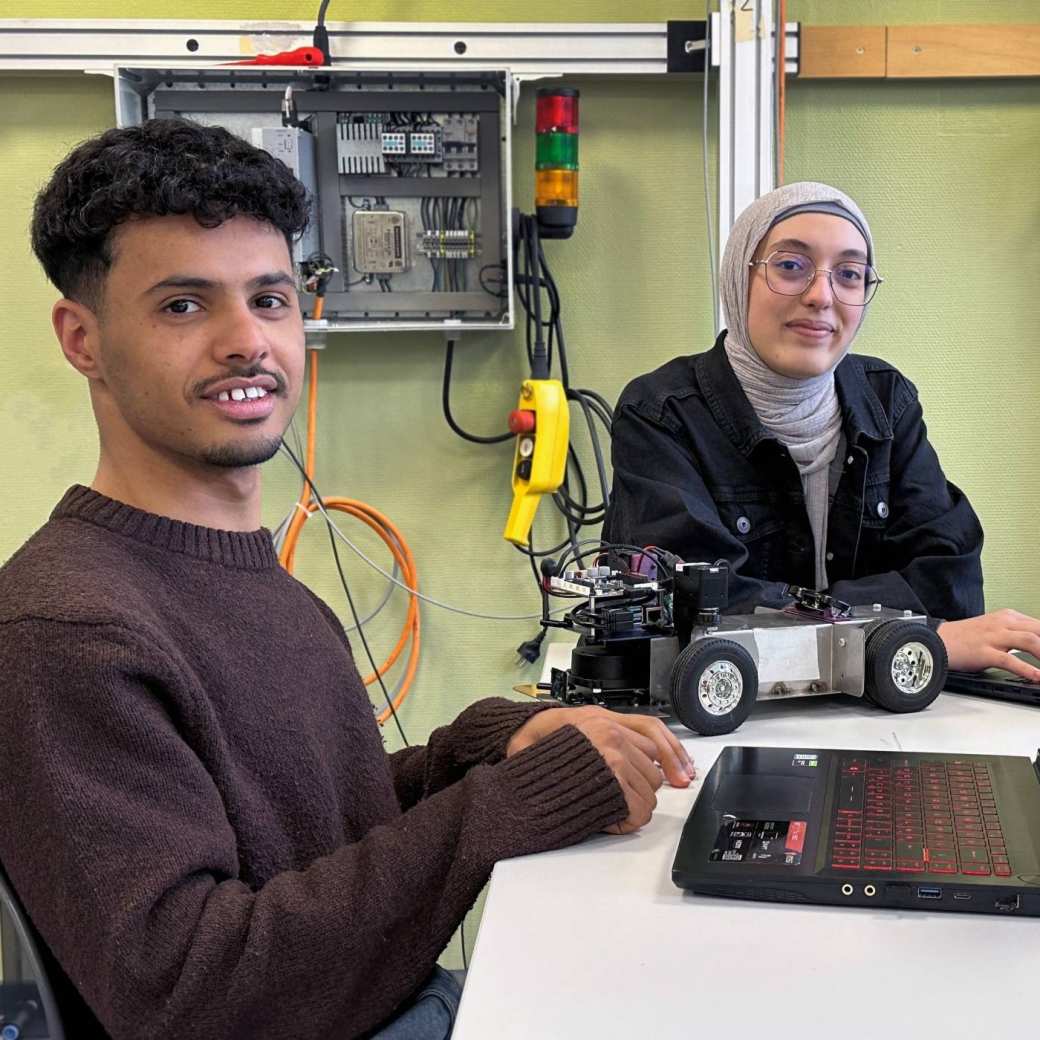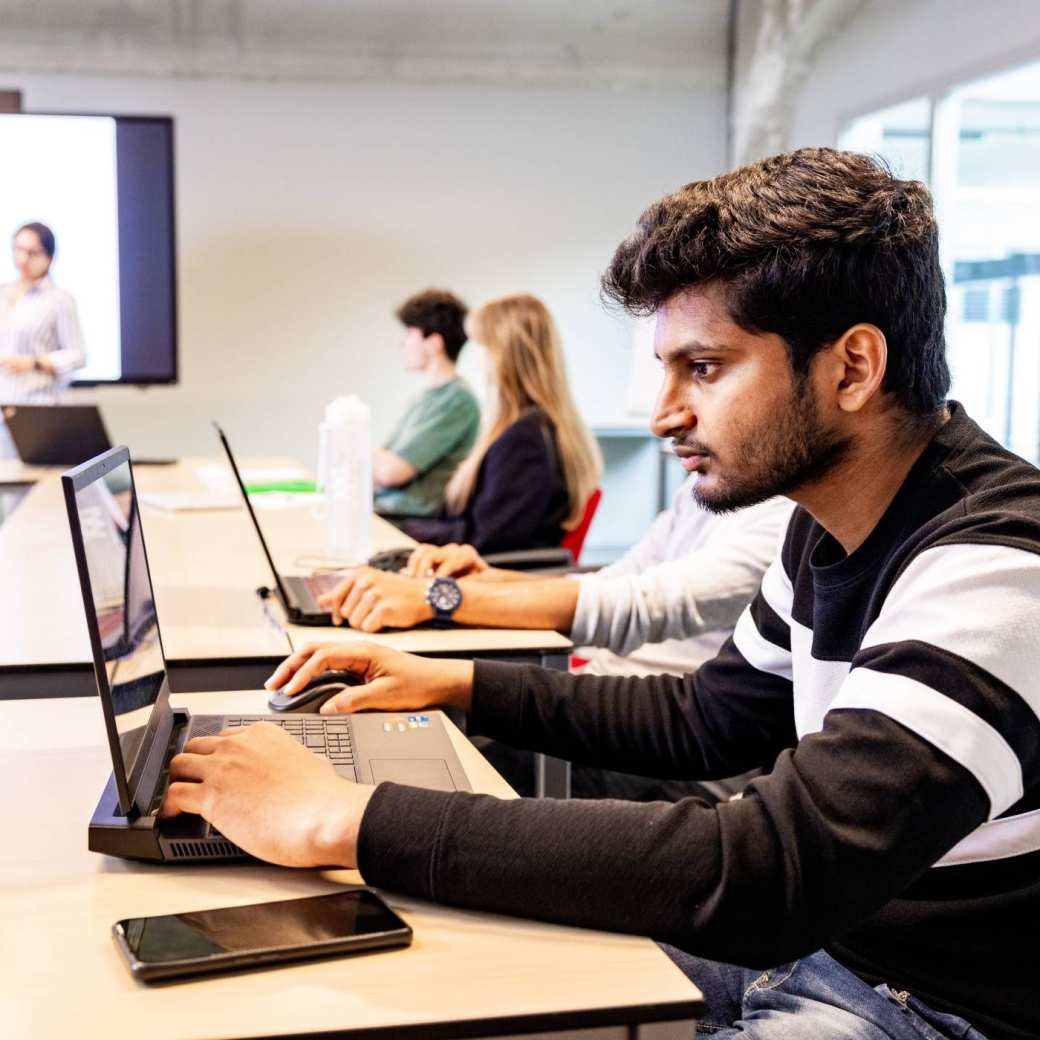Students give each other lots of feedback and that helps them get better
Soumaya El Azzab and Abdulrahman Al-Katheri started the full-time master track in Cyber Physical Systems, part of the Master in Engineering Systems, over 6 months ago. They agree it’s a tough program. But also a solid foundation for an international career. Collaboration is the key to success.

Why this master?
Soumaya, 21, came to the Netherlands from Morocco to pursue her master degree 6 months ago. She had previously completed her bachelor degree in Computer Science. "My father inspired me to go for a master degree. He even completed 2 degrees himself, so I want at least one. Thanks to this master, I can build on expertise in both software and hardware in my future work. And it's a very international program. I'm among students from as many as 15 different countries. I learn a lot from that. I have a broad outlook and would also like to find work abroad. In the Netherlands, but possibly also Canada, the United States or Germany. This master gives me a degree that could take me anywhere in the world."

Abdul, 25, is a refugee from Yemen who earned his bachelor degree in Mechatronics in Hungary 3 years ago. "In that university program, the focus was on theory, while I’m more practically oriented. During this master, I’ve found that applying what I learn in practice actually helps me understand the theory better. Many of my friends are also engineers. They all said to me: just start working, that's how you gain the experience that will help you for the rest of your life. But I wanted to keep developing further. I’ve already learned so many new things, and that’s made me a lot more confident.
What does an average week look like for a Cyber-Physical Systems student?
Abdul: "During the program you’re only at HAN 2 days a week. The rest is mostly self-study at home." Soumaya sees that as an advantage: "In the end, you understand things better that way. You gather information, explore different ideas, read a summary.... learning ends up being easier that way. And if I have questions, I can always turn to the lecturer."
What have you learned during this master?
Abdul: "The program actually consists of several subjects. Some students are better at designing models; others are more versed in technical application. Each semester, we work on 2 group projects. Because my fellow students come from very different backgrounds, we often have very different ideas. So we have to present strong arguments to convince one another. This doesn’t always make communication easy. On top of that, everyone speaks English with a different accent, not always easy either. But that’s exactly what prepares you for the real world. We even have a dedicated class that focuses on these challenges: how to collaborate effectively in a project, organize a team and communicate effectively.
Soumaya also found group work instructive. "Students give each other lots of feedback, and that helps them get better. If you’re shy, that's how you learn to get past it. It’s a good opportunity to get to know other cultures. I hope to stay in touch with the many people I've met here."
If you’re shy, that's how you learn to get past it. It’s a good opportunity to get to know other cultures. I hope to stay in touch with the many people I've met here."
What do you need to take this master degree?
Soumaya: "Self-discipline is important. I’m less well-versed in the mechanical side of things. So I took several preparatory courses before starting the master. HAN also helped me with that by recommending good study materials."
Abdul does not find the master degree easy. "It brings together a lot of information from different angles. That means you constantly have to switch focus to different topics. You really need to keep practicing every week or you won't pass." Fortunately, it’s the kind of practice he enjoys.
As a refugee, Abdul wasn’t able to start the master right away. He ended up having to wait another 2 years after applying. That also had an advantage, he observes. "Before starting a master degree, you should have a clear idea of what you want to do in the future. It’s impossible to know everything about the degree beforehand. So I’d advise everyone to look for more information. For example, go to the Open Day; I did.
Which study project are you most excited about?
The project Soumaya remembers most fondly is setting up an assembly line. "The task was to keep the line moving at a constant speed, even when items of different weight were placed on it. That's actually pretty hard to control, but we managed it well."
Abdul is enthusiastic about the guidance he receives at HAN University of Applied Sciences. "Every student gets personal attention. And that's really nice; in my previous university studies, we didn't have that kind of guidance."
Master Engineering Systems
Smartphones, medical devices, and energy grids are all examples of Cyber-physical systems. They are indispensable to individuals & society. Join us on this track and master how to integrate Computation, Communication & embedded Control to develop the next generation of cyber-physical systems.

